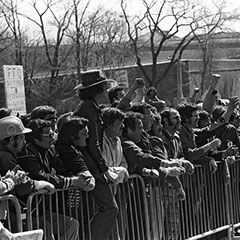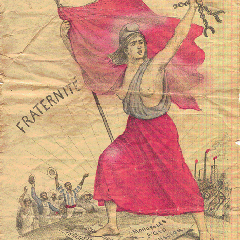May 1st, International Workers' day
It was in July 1889 that May 1st was declared the International Workers’ Day, during the Second International’s foundation congress in Paris. From 1891 to 1914, May 1st was also celebrated in Québec. Newspapers of the time spoke of “the communists’ annual parade” that went on in Montréal. In 1927, the City banned all protests in the streets so May 1st celebrations were put aside. Until the 1950s, the day was addressed without ceremony, because the parade took place in September, on Labour Day.
At the beginning of the 1970s, May 1st was reinstated under the influence of the Quiet Revolution’s political upheaval. In Québec, the context was favourable to citizen involvement and labour confederations revived May 1st events. The celebration took place in the form of a national movement.
In the 1980s, celebrations became regional festivals. Instead of organizing one great event in Montréal to reach thousands of workers, the festivities program included multiple activities held in the workplace by local unions.
Protest Songs
Music remains a formidable vehicle for ideas and a perfect medium to express commitment to a cause. Songs cause, carry and transform moods. These characteristics make them great tools for the social struggles evoked in protest songs. They may be a marginal genre, but their lyrics serve a cause. Often, well-known melodies are used to emphasize meaningful verses, easily memorized by the crowd. Chanted in unison, the protest song transports the audience, generating a feeling of unity, complicity, strength, and power.
Starting in the 1960s, the Vietnam War in the United-States and the May ’68 protests in Europe caused the emergence of politically-aware artists that set the tone for an entire generation. Bob Dylan’s song Blowin’ in the Wind is considered the first modern revolt song to be broadcast on a global scale. It initiated the media coverage of this type of songs. Inspired by a slave song (Negro spiritual), the piece was intoned by the 250,000 participants in Martin Luther King’s walk on Washington in 1963.
In Québec, just as elsewhere, some songs were written as protest songs or in support of activists. For example, these songs can be used to cheer on strikers. The song titled Faut pas lâcher (Don’t Give Up), composed by Émilien Laplante in 1975, was written to support the strikers in Thetford Mines who campaigned for the health and wages of the asbestos miners.
For more than three months
The guys have been on strike
And as far as we can tell
They aren’t fed up
Spoiled meat
We’ve all eaten some
But asbestos is a danger
We just can’t swallow
Guys, we can’t quit
And we shouldn’t back down
Because we aren’t wimps
And we have to fight together
Socially Engaged Song
Download video: MP4, (38,84 MB), WebM, (40,45 MB), Ogg (25,17 MB) (3 minutes 16 seconds)
Interview with Philippe Bournival, Teacher at the Conservatoire de musique de Trois-Rivières and Ph.D. student in Musical Interpretation at the Université de Montréal, about socially engaged songs.
Interview with Philippe Bournival
If Desjardins has a sword-like pen, Boris Vian has a pen I would deem fiery, maybe even atomic. In a cynical manner, he invites political figures of his time to a small informal meeting. Here's what happened when they got together "and when the bomb exploded, of all these characters, nothing was left." Boom! La java des bombes atomiques (The Atomic Bomb Java).
Fortunately, protest songs can be softer, more poetic and delicate. Yves Duteil, assisted by a beautiful text and melody, invites us to realize the beauty of the French language. A beautiful heartfelt text, a beautiful melody, in which he tells us: "It is a beautiful language with splendid words that carries its history through its accents. A language where one can feel the music and the scent of herbs, goat cheese and wheat bread."
Rock et Belles Oreilles, on the same topic, but with a more humoristic and sarcastic tone, mocks nothing less than songwriters who choose Team Shakespeare rather than Team Molière. "Because Icitte (here) is a small marché (market). Icitte, there is no débouché (opportunities). I want to pogne (be popular)."
Speaking of our English-speaking friends, did you know that you can protest in your pajamas? Yep! In 1969, John Lennon and Yoko Ono were singing for peace during a famous bed-in. "All we are saying is give peace a chance."
Let's move from this bedridden song to this hot topic: ecology. My friend and poet from Trois-Rivières Jean Laprise tells us: "One day there will be no more if I too continue to sully great waters starting with the stream." Whether in a humorous or poetic manner, while wearing pajamas or a tie, if you have a message to offer, forget the trees and sing, because to paraphrase Brassens: "Dying for ideas, yes, but dying a slow death. Yes, but dying a slow death."
Philippe Bournival
Teacher at the Conservatoire de musique de Trois-Rivières and Ph.D. student in Musical Interpretation at the Université de Montréal
Technical Team:
David Leblanc: Director/Cameraman/Editor
Jonathan Leblanc: Technician
Acknowledgement
Conservatoire de musique de Trois-Rivières
The Internationale, for the Workers’ Rights
Written in 1871 by Eugène Pottier (music by Pierre Degeyter in 1888) the Internationale, a symbol for social struggles, became the official anthem of the labour movement in 1889. Translated in just about every language and a part of all great revolutionary movements since the beginning of the 20th century, this song voices the feeling of injustice that plagued the poverty-stricken working-class. It is a call to the communist revolution, in accordance to the ideas put forth by philosopher Karl Marx at the middle of the 19th century.
After the Russian Revolution, in October 1917, The Internationale became the revolutionary hymn of the communist and labour movements around the world. For Canada’s Communist Party, founded in 1921, and Québec’s Communist Party founded in 1965, the song is fundamental: it is intoned at the end of assemblies and rallies labour movements from different countries. The Internationale is also a song of hope. During the Great Depression, many sang it without actually being communists, because it brought hope and fought against oppression.
Stand up, damned of the Earth
Stand up, prisoners of starvation
Reason thunders in its volcano
This is the eruption of the end.
Of the past let us make a clean slate
Enslaved masses, stand up, stand up.
The world is about to change its foundation
We are nothing, let us be all.
This is the final struggle
Let us group together, and tomorrow
The Internationale
Will be the human race
The Internationale
Download audio (2 minutes 12 seconds, 2.03 MB)
Male voice (Paul Jauresse) singing The Internationale accompanied by an orchestra.
Lyrics: Eugène Pottier
Music: Pierre Degeyter
Performer: Paul Jauresse
1905. Source: www.archive.org
Arise, oppressed of the earth!
For justice thunders condemnation:
A better world's in birth!
No more tradition's chains shall bind us,
Arise, you slaves, no more in thrall!
The earth will rise on new foundations:
We, who were nothing, shall be all!
Forward, brothers and sisters,
And the last fight let us face;
The Internationale
Unites the human race!
Workers, peasants, we are
The great party of labourers.
The earth belongs only to men;
The idle will go to reside elsewhere.
How much of our flesh have they consumed?
But if these ravens, these vultures
Disappear one of these days,
The sun will shine forever.
Forward, brothers and sisters,
And the last fight let us face;
The Internationale
Unites the human race!
Solidarity Forever
If there ever was a song that symbolized the trade-union campaigning, it is certainly Solidarity Forever. Composed in 1915 by American labour activist Ralph Chaplin, the song was adapted in many countries. The French version – Solidarité, mes frères – was written by Jean Baumgerten. Nowadays, the song still unites protesters or strikers.
Solidarity forever,
Solidarity forever,
Solidarity forever,
For the union makes us strong.
When the union's inspiration through the workers' blood shall run,
There can be no power greater anywhere beneath the sun;
Yet what force on earth is weaker than the feeble strength of one,
But the union makes us strong.
May 1st, International Workers' day




